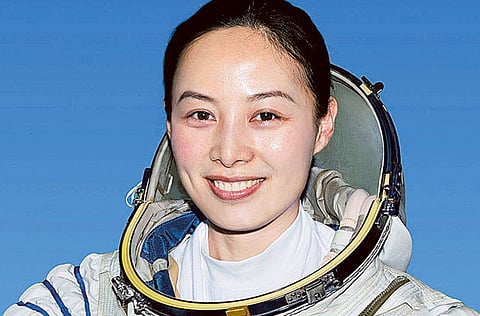China to send second woman into space: officials
Female astronaut to go into China's longest space mission yet

Beijing: China is to send its second woman astronaut into orbit on its longest mission yet, space officials said on Monday, as the country works towards building a space station.
The Shenzhou-10 — the name means “Divine Vessel” — will be launched on a Long March rocket at 9.38am GMT on Tuesday, Wu Ping, spokeswoman for China’s space programme, told a news conference.
The crew will be in orbit for 15 days, she said, and will include Wang Yaping, the second woman China has sent into space.
Beijing sees the multi-billion-dollar space programme as a symbol of its rising global stature, growing technical expertise, and the ruling Communist Party’s success in turning around the fortunes of the once poverty-stricken nation.
Wang, wearing a blue jumpsuit with a red Chinese flag affixed to her chest, stood up and saluted journalists at a separate news conference, as she and her two male fellow astronauts sat on a stage enclosed in glass for quarantine purposes.
She will give lessons to schoolchildren from orbit, she said, smiling.
Wang, 33, is a major in the People’s Liberation Army and also a member of the Communist Party, the state-run Xinhua news agency reported.
Flight commander Nie Haisheng, 48, a major-general in the army, who went into space on board Shenzhou-6, told reporters: “We will carry out a glorious mission.
“I would like to thank all my comrades in the army and assure them that we are determined to accomplish our task,” he added.
The third crew member is Zhang Xiaoguang, 47, a colonel.
The craft will dock with the Tiangong-1 — “Heavenly Palace” — space laboratory, and the crew will transfer into it and carry out medical and space technology experiments.
The mission will mark a crucial step towards China’s goal of building a full space station capable of housing astronauts for extended periods.
China first sent a human into space only in 2003 and its capabilities still lag behind the US and Russia, but it has a highly ambitious programme including plans to land a man on the moon and build a station orbiting earth by 2020.
The previous Shenzhou mission, in June last year, included China’s first woman astronaut, Liu Yang, who became a national heroine.
The coming voyage “will be more complex than any mission China has attempted before”, Morris Jones, an independent space analyst based in Sydney, Australia, told AFP.
“Rendezvous and docking is a tricky operation for any space programme regardless of how much experience you have,” he said.
China has conducted such operations several times before both with and without humans, he said, but this time the crew will experiment with carrying out the rendezvous at different angles of approach.
“I have no doubts that the mission will be successful,” he said. “The technology is well-tested and it’s proven itself many times.”
Officials have said China will land an exploratory craft on the moon for the first time this year.
At the same time the United States, long the leader in the field, has scaled back some of its programmes, such as retiring its space shuttle fleet.
Jones said the latest mission is another significant step in China achieving its space station goal.
“By demonstrating rendezvous and docking as well as the ability to live in space for a long period of time, they’re gradually showing that they have the technology and the procedures that they will need to construct that space station,” he said.


